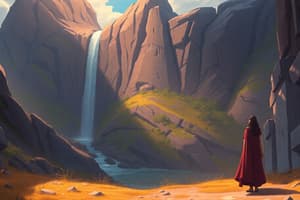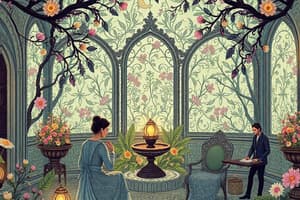Podcast
Questions and Answers
What primarily distinguishes literature from other forms of writing?
What primarily distinguishes literature from other forms of writing?
- It employs creative language and expresses human experiences. (correct)
- It must always follow a strict thematic structure.
- It is intended solely for entertainment purposes.
- It exclusively focuses on factual information.
In what way can literature be seen as a reflection of society?
In what way can literature be seen as a reflection of society?
- It should avoid any controversial topics.
- It provides a factual account of historical events.
- It allows for the expression of diverse viewpoints and critiques social norms. (correct)
- It is primarily focused on romantic themes.
How does literature contribute to individual identity formation?
How does literature contribute to individual identity formation?
- It promotes uniformity in thought and experience.
- It discourages personal reflection and introspection.
- It offers a definitive answer to personal questions.
- It allows individuals to see themselves in various characters and narratives. (correct)
What role does emotion play in literature?
What role does emotion play in literature?
What is a common misconception about the value of literature?
What is a common misconception about the value of literature?
Flashcards
What is literature?
What is literature?
Literature refers to written works, especially those considered to be of artistic or intellectual value. It encompasses various forms like novels, poems, plays, essays, etc. It reflects human experiences, emotions, ideas, and perspectives.
Why is literature important?
Why is literature important?
Literature is a powerful tool for understanding human nature. It gives us insights into diverse cultures, historical periods, and personal journeys.
What themes are explored in literature?
What themes are explored in literature?
Literature often explores themes like love, loss, war, and social issues, providing a platform for reflection and understanding.
What genres are there in literature?
What genres are there in literature?
Signup and view all the flashcards
How is literature connected to history?
How is literature connected to history?
Signup and view all the flashcards
Study Notes
Defining Literature
- Literature encompasses a broad range of written works, including novels, poems, plays, essays, and more.
- The defining characteristic isn't the form, but the artistic expression and lasting impact.
- It often explores human experience, emotions, and ideas in a meaningful way that goes beyond simply recounting facts or events.
- Literature can be a vehicle for social critique, historical reflection, or personal insight.
- Quality literature often has lasting value, engaging readers across generations.
Key Elements of Literature
- Narrative: Stories told in prose or verse, conveying experiences and perspectives.
- Descriptive Language: Rich sensory details used to create vivid images and atmospheres.
- Figurative Language: Devices like similes, metaphors, and personification, adding layers of meaning and creativity.
- Character Development: Exploring the motivations, flaws, and growth of characters within the story.
- Plot: The sequence of events and conflicts that drive the narrative.
- Theme: The central ideas or messages explored in the work of literature.
Types of Literature
- Poetry: Verse form, using rhythm, meter, and imagery to evoke emotion and meaning.
- Drama: Written for performance, exploring human interaction and conflict.
- Prose: Writing that doesn't adhere to the strict form of poetry or drama, including novels, short stories, and essays.
- Mythology and Folklore: Stories passed down through generations, often explaining the natural world or cultural values.
- Essays: Non-fiction works exploring particular ideas or observations.
- Biographies and Autobiographies: Written accounts of real people's lives.
- Historical Fiction: Storytelling set in a historical context, often blending fact and imagination.
- Science Fiction: Literature exploring imaginative worlds and concepts, often intertwined with scientific or technological themes.
- Fantasy: Stories set in magical or mythical realms.
Functions of Literature
- Entertainment: Providing enjoyment and escapism through storytelling.
- Social Commentary: Addressing social issues, injustices, or cultural norms.
- Historical Record: Offering insights into past events, values, and beliefs.
- Emotional Expression: Allowing authors and readers to explore a wide range of human emotions.
- Moral and Ethical Reflection: Stimulating thought about right and wrong, good and bad.
- Cultural Preservation: Transmitting cultural heritage and traditions through storytelling.
- Language Exploration: Demonstrating the power of language to communicate and evoke meaning.
Literary Criticism
- The analysis and interpretation of literature.
- Different approaches exist, including formalist, biographical, historical, psychological, and feminist criticism.
- Each approach offers a unique lens to understanding the work.
- Critical analysis examines literary techniques, themes, and social contexts to unveil deeper meanings within a text.
Relationship between Author and Audience
- The author's experiences, values, and perspectives shape the literary work.
- Readers bring their own backgrounds and interpretations to the text.
- An understanding of the author and historical context enriches the act of reading.
Studying That Suits You
Use AI to generate personalized quizzes and flashcards to suit your learning preferences.




